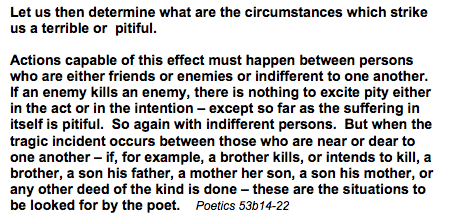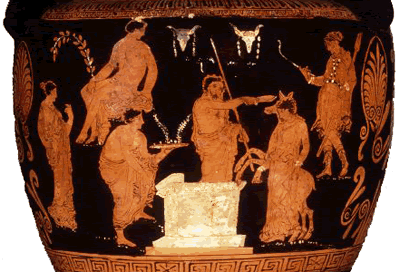
2) character and action

Aristotle is unequivocal regarding his primary starting point for evaluating a person's character; one begins by observing the subject's actions. Since the plot entails the structure of the action in drama, character is then a function of the plot, and character, the second element on Aristotle's rank list of the parts of the drama, could not exist without item number 1, the plot. While it follows that character could not exist without action, Aristotle argues that it is possible in weak dramas for action to exist without the expression of character.

Aristotle's idea of character, as put forth in the Poetics, has an intriguing similarity to the notion of karma that is essential to Hindu religious thought. In effect, it posits that human beings acquire their deeds, and that these deeds are written into their character and carried in their blood, possibly through subsequent generations.

Given this process by which one's actions are written into his or her character, it is understood that a certain class of actions is most likely to define wicked character - or to pollute or stain the character of the doer, to use Aristotle's terminology. These are acts of violence (παθήματα) or tragic acts, as they are defined in Aristotle's basic definition of tragedy.
Furthermore, Aristotle reserves acts of violence against people who are related to the doer of the act through kinship or close natural ties for the category of the worst of the worst. Where violence against an enemy (ἐχθρός) is considered appropriate, it is abhorrent when it is perpetrated against a friend or member of one's family (φίλος). Interestingly enough, this is precisely the situation surrounding many of the violent acts in ancient Greek tragedy. In stressing the horror of such acts, Aristotle is reflecting injunctions that are common to many of the world's major religious traditions. Compare Aristotle's statement with passages from The Bible or from The Bhagavad Gita.
Aristotle |
 |
Abraham |
And the angel of the Lord called unto him out of the heaven, and said… lay not thine hand upon the lad, neither do thou any thing unto him: for now I know that thou fearest God, seeing thou has not withheld thy son, thine only son from me. Genesis 22,12 |
| Arjuna Bhagavad Gita |
Krishna, at the sight of these kinsmen thus arrayed and longing for battle, my limbs give way, and my mouth is parched: nay, my frame shakes and hair stands on end. The bow, Gandiva, drops from my hand and my skin burns all over, my mind is reeling, as it were, and I am not able to stand… Krishna, it does not behoove us to kill our relations, the sons of Dhritarashtra. For how shall we be happy after killing our own kinsmen? |
